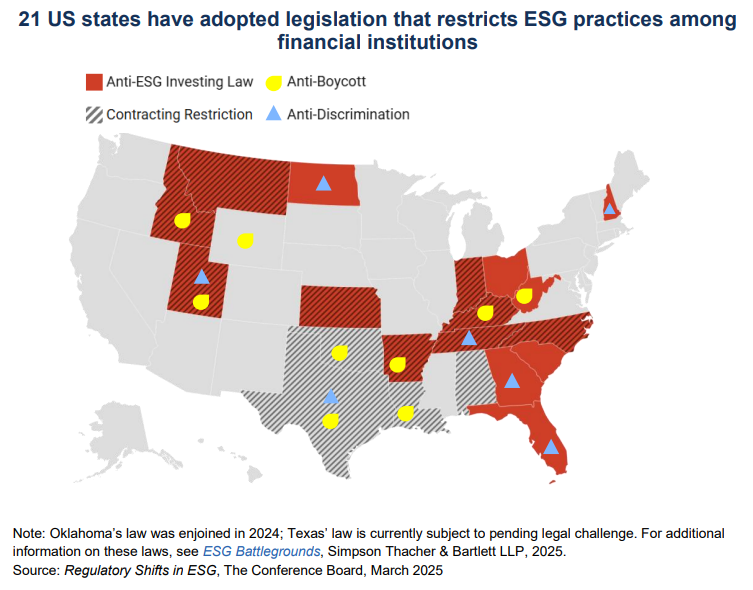Leading through the climate crisis and political uncertainty
 Unsplash
Unsplash Unsplash
Unsplash· 8 min read
We’re living in a time of planetary crisis and political flux. Even as fires rage, seas rise, and temperatures shatter records, sustainability has become a newly politicized terrain. ESG investing, once the mainstream approach, is now the target of lawsuits and legislative pushback in the United States. In Europe, corporate sustainability directives are gaining sharper teeth, while climate litigation grows into a formidable force of accountability.
“Brands should lead by example … it’s not even a choice - we just need to do it,” said Marco Bizzarri, former CEO of Gucci (Bizzarri, n.d.). His words feel both urgent and oddly understated. Leading by example is precisely what’s under pressure.
At stake is the future of leadership itself. Will sustainability stay a box-ticking exercise in corporate communications? Or can it become a transformative force, capable of weathering political headwinds while still delivering a more equitable, regenerative future?
A few years ago, ESG (Environmental, Social, and Governance) was heralded as the business’s moral compass. Today, it’s under siege.
In the United States, a wave of state-level action has sought to bring consideration of mitigation factors and corporate decision-making. Attorneys general from conservative states argue ESG goals undermine fiduciary duty, pushing politics into business. Several major financial institutions have found themselves caught in subpoenas and lawsuits simply for factoring climate risk into portfolios (Reuters, 2024).

Credit: Harvard Law School Forum on Corporate Governance
This backlash, however, isn’t universal. Europe is moving in the opposite direction. The European Union’s Corporate Sustainability Reporting Directive (CSRD) demands far more transparency. It requires thousands of companies, both European and non-European, to disclose detailed sustainability impacts, risks, and strategies. It’s a regulatory sea-change that aims to bridge the gap between rhetoric and reality.
Meanwhile, climate litigation is gaining steam worldwide. Lawsuits challenge greenwashing claims, seek damages for climate harms, and pressure companies and governments alike to act on science-based targets. This rising legal threat is reshaping boardroom discussions, as leaders reckon with real consequences for sustainability inaction or misrepresentation.
As the Harvard Law School Forum on Corporate Governance (n.d.) notes, the ESG landscape has become fragmented and politically volatile. Businesses today navigate not one global standard, but a patchwork of expectations and regulatory risks.
Nowhere is this volatility more visible than in the world of luxury fashion. Here, brands trade on visions of beauty and aspiration, yet face public scrutiny like never before.
Nic Gorini of Spin Ventures believes technology and creativity are converging to offer new models of circularity. “We’re living in a world where technology, data, and design give us incredible opportunities to create better models for fashion and retail,” he said in our conversation, recalling how even something as simple as an “ugly sweater” party illustrates the problem of disposable fashion and the opportunity for circular solutions (Gorini, 2025).
Luxury houses like Gucci have tried to stay ahead of this curve. “Gucci is committed to a culture of purpose, putting environmental and social impact at the heart of the brand,” Marco Bizzarri once declared (Bizzarri, n.d.). Their initiatives under the Gucci Equilibrium banner have embraced circular design, alternative materials, and ambitious carbon accounting. The brand recently stated: “We’re deeply committed to transforming our business model, reducing our footprint while creating value for nature and communities. Led by science, we hold ourselves accountable to be transparent, responsible, and innovative every step of the way” (Gucci, 2025).
Yet consumers and regulators remain wary. Greenwashing allegations are frequent. A single misstep, an exaggerated claim, or a misleading label can erode brand trust and trigger legal consequences.

Credit: BFA/Swarovski Foundation
This credibility gap isn’t purely corporate. As Jakhya Rahman-Corey, Director of the Swarovski Foundation, explained:
“We know sustainability is important - it matters. However, there are numerous layers and complexities. Sustainability and philanthropy are parallels, not separate worlds. It’s essential to keep the sense of community alive because business and society aren’t mutually exclusive.” (Rahman-Corey, 2025)
For Rahman-Corey, true leadership requires holding on to community even when commitments from industry players remain equivocal. That sense of alignment between values, brand mission, and societal good is crucial in distinguishing authentic leaders from mere marketers.
For leaders navigating this turbulent landscape, the stakes are clear. It’s no longer enough to issue sustainability reports or sign global pledges. They must ask what separates performative leadership from transformative leadership.
Rahman-Corey offered one crucial test: authentic community creation.
“It’s so essential to listen to local voices, because many times they already have solutions, and they know the challenges better than anyone else. It’s about asking: How can we contribute to that baseline, rather than imposing our own?” (Rahman-Corey, 2025)
That ethos underpins the Swarovski Foundation’s approach, where philanthropy and sustainability intersect to forge meaningful partnerships and long-term impacts.
“Impact isn’t short-term. We have to stay the course, but evolve with the times,” Rahman-Corey added. “It’s about having optimism that we as individuals, as organizations, and as communities can lead to something positive, even if we don’t reach every target. We still have to try.” (Rahman-Corey, 2025)
Nic Gorini shares this optimism. He sees leadership as cultivating desire, not sacrifice. “There’s this myth in some political leaders’ minds that sustainable business models mean sacrifice—that you have to give something up,” he said. Instead, he points to luxury spaces where reclaimed water is triple-filtered into a beautiful resource and green roofs transform skylines into gardens. “It’s not about living less—it’s about living better.” (Gorini, 2025)

Federico Turconi, formerly of Gucci and now with SA Hospitality, echoed this ethos in hospitality: “The true essence of hospitality lies in cultivating a true sense of place for every guest, employee, and partner that walks through our doors - it is a great honor and responsibility.” (Turconi, 2025)
This is the essence of adaptive leadership as Ronald Heifetz describes: leading not from positional authority, but by engaging stakeholders in co-creating solutions, even when there are no easy answers (Heifetz, Grashow, & Linsky, 2009).
Peter Senge’s idea of systems leadership reinforces this, urging leaders to move beyond organizational silos to see the broader connections shaping crises like climate change. Leaders who thrive in this era will be those who invite collective intelligence, rather than imposing top-down fixes (Senge et al., 2008).
All this talk of intention begs for a transition to action. For many organizations, intentional leadership starts with radical transparency. It’s about publishing both successes and failures, creating space for course corrections. It’s about auditing your supply chains, not just for compliance but for community impacts. And it’s about inviting stakeholders to co-create solutions. Multilateral institutions like the UN and OECD play a critical role in shaping this accountability. But as Rahman-Corey pointed out:
“Every agency has its characteristics and its mission, and every agency within that has its own unique challenges, the least of which is that they are governed by an international body that might have a variety of values.” (Rahman-Corey, 2025)
Still, the work must continue. As the World Economic Forum (n.d.) reports, business leaders increasingly recognize that sustainability is tied to resilience and market stability, not just philanthropy. Meanwhile, metrics like the Sustainable Development Index, which measures ecological efficiency in human development, are pushing leaders to think beyond GDP toward more holistic measures of progress (Hickel, 2020).
The year ahead will bring more summits, more climate weeks, and more debates about sustainability’s place in business and politics. As we look toward COP30 and beyond, the stakes have never been higher. Leaders like Jakhya Rahman-Corey, Nic Gorini, Gucci’s leadership, and Federico Turconi’s cross-industry innovation remind us that intentional leadership isn’t about slogans. It’s about integrity in the face of uncertainty, courage to challenge myths of sacrifice, and humility to co-create solutions.
“Actually, we’re inviting you to live more beautifully - if you’re brave enough to imagine it with us,” Gorini said later in our conversation. That is the call of intentional leadership in this time of climate and political reckoning: to imagine, to act, and to keep moving forward irrespective of how the winds shift.
illuminem Voices is a democratic space presenting the thoughts and opinions of leading Sustainability & Energy writers, their opinions do not necessarily represent those of illuminem.
Berg, F., Koelbel, J. F., & Rigobon, R. (2022). Aggregate confusion: The divergence of ESG ratings. Review of Finance, 26(6), 1315–1344. https://doi.org/10.1093/rof/rfac031
Bizzarri, M. (n.d.). Gucci sustainability commitments. Vogue UK. Retrieved June 2025 from https://www.vogue.co.uk/news/article/gucci-sustainability-commitments
Gorini, N. (2025, July 2). Personal communication [Interview with Monica Sanders].
Gucci. (2025). Sustainability and purpose culture statements. Gucci Equilibrium. Retrieved June 2025 from https://www.linkedin.com/posts/gucci_gucciequilibrium-activity-7231268784928415744-2_NE
Harvard Law School Forum on Corporate Governance. (n.d.). ESG and corporate governance updates. Retrieved June 2025 from https://corpgov.law.harvard.edu/
Heifetz, R. A., Grashow, A., & Linsky, M. (2009). The practice of adaptive leadership: Tools and tactics for changing your organization and the world. Harvard Business Press.
Hickel, J. (2020). The sustainable development index: Measuring the ecological efficiency of human development. Ecological Economics, 167, 106331. https://doi.org/10.1016/j.ecolecon.2019.106331
Lyon, T. P., & Montgomery, A. W. (2015). The means and ends of greenwash. Organization & Environment, 28(2), 223–249. https://doi.org/10.1177/1086026615575332
Rahman-Corey, J. (2025, July 2). Personal communication [Interview with Monica Sanders].
Reuters. (2024, January 10). ESG backlash in U.S. politics. Reuters. Retrieved June 2025 from https://www.reuters.com/markets/sustainable-finance/us-esg-backlash-grows-2024-01-10/
Senge, P., Smith, B., Kruschwitz, N., Laur, J., & Schley, S. (2008). The necessary revolution: How individuals and organizations are working together to create a sustainable world. Doubleday/Currency.
Turconi, F. (2025). Leadership announcement and sustainability philosophy. LinkedIn. Retrieved June 2025 from https://www.linkedin.com/posts/federico-turconi-75446314_i-am-very-excited-to-join-sa-hospitality-activity-7255026067961192449-NZYs and conversation with Monica May 2025
World Economic Forum. (n.d.). Various sustainability and leadership reports. Retrieved June 2025 from https://www.weforum.org/
Aaron Bruckbauer

Pollution · Greenwashing
illuminem briefings

AI · Labor Rights
illuminem briefings

Greenwashing · Public Governance
The Guardian

Natural Gas · Greenwashing
Financial Times

Greenwashing · Fashion
Sustainable Views

Greenwashing · Net Zero